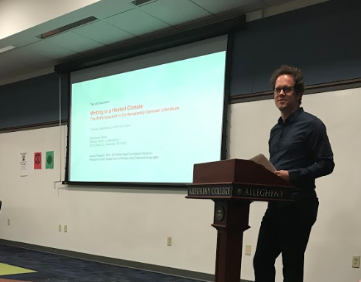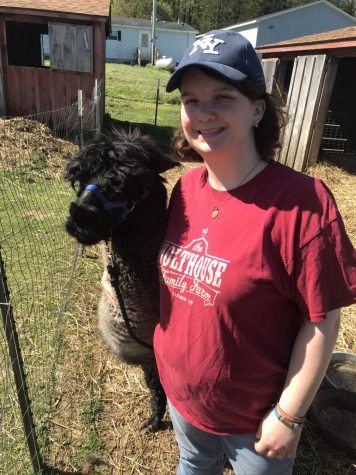Trautsch delivers lecture on how German literature affects climate change

Max Kade Foundation Writer-in-Residence Asmus Trautsch discusses German literature’s ability to spread awareness on climate change during his lecture on Tuesday, Sept. 24, 2019, in the Pelletier Library Collaboratory.
Every year, the Department of Modern and Classical Languages invites a Max Kade Foundation Writer-in-Residence to campus to teach a short course and deliver a reading from the writer’s selected works. This year, there was a new addition.
This year’s writer-in-residence, Asmus Trautsch, asked Assistant Professor of German Julia Ludewig if in addition to his reading and teaching, he could give a lecture on his studies, which relate to the climate crisis. Trautsch presented his lecture at 6 p.m. Tuesday, Sept. 24, in the Pelletier Library Collaboratory.
“Tonight, in fact, is a premiere in that this year the writer asked if he could do a general lecture in addition to his lecture,” Ludewig said during her introduction of Trautsch. “I said ‘sure.’ And it just so happens that (his studies) coincide with the (Climate Week).”
Trautsch’s work focused on German literature and the effect it can have on spreading awareness of climate change. His lecture, titled “Writing in a Heated Climate”, focused on different forms of German literature that exist and discuss this “heated” topic.
The main focus of Trautsch’s lecture was the concept of Anthropocene.
“My one sentence (definition) is that Anthropocene is the age that wherever humans go on the planet, on land or in the hydrosphere, they will find their own products,” Trautsch said. “It means that human powers, the activity of human production and human agency and forms of pursuit shape the whole planet. We have a dominating force that’s stronger than any wind, any seas, anything else, and this is humanity.”
Trautsch explained that the concept of Anthropocene has been around for a long time, but there is debate about when it actually began. Some people think it has been in use since the 1980s, but others claim it officially began in 1945, around the same time period as “the Great Acceleration.”
“What does (Great Acceleration) mean?” Trautsch asked. “It basically means that beginning in roughly the 1950s, many socioeconomic trends and developments started to grow exponentially.”
Additionally, Trautsch said that around the same time earth system traits began to grow, leading to the idea that the growth of the socioeconomic trends caused the growth of the earth system trends.
“This is called the Growth Rate Acceleration, which is expressive of the Anthropocene,” Trautsch said.
Trautsch moved on to discuss the different mass extinction events since the dinosaurs, explaining that due to human activity, different species are now experiencing similar extinction events. Trautsch moved onto climate change and the different German literature works that exist that serve to reflect the Anthropocene.
Most recently the existing literature that Trautsch chose to focus on are prose, eco-thrillers, climate change novels, short stories and essays.
“I’m really talking about the literature that reflects and deals with the consequences of Anthropocene,” Trautsch said.
Trautsch translated the titles of the books and poems he chose to focus on in his lecture, including a book about the melting of glaciers, translated to “Melting Ice.”
“The main idea is that the novel itself becomes a testimony to (the author’s) thinking,” Trautsch said. “He is a climate activist … and writing the section of his notebook that we read in the book gives us an idea of his ideas.”
Trautsch focused a significant portion of his lecture on poetry that focuses on the Anthropocene and read four poems to his audience, including a poem titled “Dodo”, in which author Silke Scheuermann writes of wanting to bring back the dodo, an extinct bird.
“That’s very much of the Anthropocene,” Trautsch said. “I mean, it’s a question of how one (talks) about that, but that’s what the poem is about.”
After discussing poetry, Trautsch turned his lecture to focusing on German dramatic writing and theatre. He discussed in great detail one production in which actors were at a world climate change conference. The production involved the whole audience, who then got to choose which country to represent, and how the people on stage also asked questions to the audience and all together they came to a decision on what they would do about climate change.
“In the end, they actually have to come together and commit to climate change goals,” Trautsch said. “But even the performance didn’t meet the two-degree goal.”
Trautsch added that at the end of the play there was an artificial sun that got hotter and hotter until the whole theater was “very, very hot.”
Trautsch concluded his lecture by discussing various opportunities for the arts to be used to spread awareness of climate change, along with the critiques and political actions that already exist.
“I’m going to finish with a quote from a great German poet: … ‘As waves spearheading to (a beach), our minutes are dashing toward their end,” Trautsch said.
The lecture was followed by a question and answer session and a catered reception for everyone in attendance.

Sara Holthouse is a senior from Panama, NY. This is her third year/final semester on staff, where she has previously served as news editor for the past...








